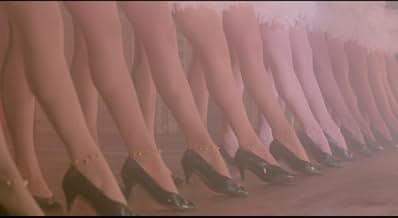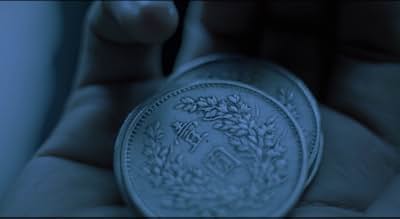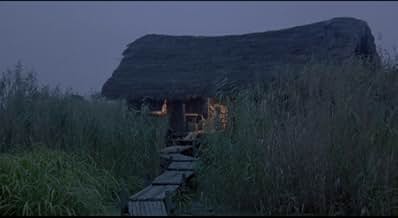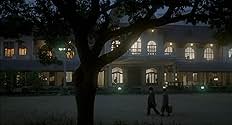IMDb RATING
7.1/10
6.2K
YOUR RATING
A provincial boy related to a Shanghai crime family is recruited by his uncle into cosmopolitan Shanghai in the 1930s to be a servant to a ganglord's mistress.A provincial boy related to a Shanghai crime family is recruited by his uncle into cosmopolitan Shanghai in the 1930s to be a servant to a ganglord's mistress.A provincial boy related to a Shanghai crime family is recruited by his uncle into cosmopolitan Shanghai in the 1930s to be a servant to a ganglord's mistress.
- Nominated for 1 Oscar
- 5 wins & 4 nominations total
- Director
- Writers
- All cast & crew
- Production, box office & more at IMDbPro
Featured reviews
First of all, I'm a huge fan of Gong Li.
"Shanghai Triad" one of my favourites out of her movies. 'Favourite' in my definition applies only when I want to watch a film again and again and liking it more everytime I watch it.
"Shanghai Triad" is a beautiful movie, with a clever plot developed within the time frame of a mere seven days. The depth of character also adds to the brilliance of the film. The character of "Xiao Jingbao" (sometimes translated as "Bijou") played by Gong Li at first seems shallow, as she is a chanteuse and moll of a powerful gangster. As her character develops, one recognises that underneath her materialistic values imposed upon her by society, lies a very pure nature. The discovery of the depth of her characterisation is especially moving, and propels towards an emotional climax, during which tragedy arouses sympathy and anguish.
The little boy in the movie is also noted for his excellent performance. He silently dominates the atmosphere of the film, looking on without speech, but secretly and strongly decided in the mind. He acts as the eye through which we see the world in the movie.
Apart from all the technical approval and standardised appraisal of the movie, I have to add I also loved Gong Li's singing in the movie. Yes, it was actually her singing! Her singing is just as beautiful as herself and her performances. Watch her dance and sing elegantly on stage, not one moment has she been not charming in the movie.
On the director's part, this is a very different film from all other previous Zhang Yimou films. But like all his other films, the story is meaningful and the cinematography is breath-taking.
Some more little background facts about the movie: during the making of the film, neither Gong Li nor director Zhang Yimou was in particularly good mood. And that was because, if you know about Gong Li and Zhang Yimou's relationship before, they broke up. Reason? Well, in short, Zhang Yimou's a workaholic, and Gong Li like any other woman, wanted security and family which he was unable to give. And interestingly, and sarcastically (in our point of view), there was a scene in the movie where Gong Li was chatting with the woman peasant. The peasant thought Gong Li was already married, but she said no. With surprise, the peasant said by this age she should be getting married. Gong Li said "Yes, I should be getting married. But do I know who to get married to?"
Of course Gong Li is married now, to a Singaporean business man.
Getting back to the movie, it's just a classic. It's visually absorbing, narratively ingenius, audibly satisfising, emotionally powerful, and just speechlessly amazing. If one can love a movie, I love this movie.
"Shanghai Triad" one of my favourites out of her movies. 'Favourite' in my definition applies only when I want to watch a film again and again and liking it more everytime I watch it.
"Shanghai Triad" is a beautiful movie, with a clever plot developed within the time frame of a mere seven days. The depth of character also adds to the brilliance of the film. The character of "Xiao Jingbao" (sometimes translated as "Bijou") played by Gong Li at first seems shallow, as she is a chanteuse and moll of a powerful gangster. As her character develops, one recognises that underneath her materialistic values imposed upon her by society, lies a very pure nature. The discovery of the depth of her characterisation is especially moving, and propels towards an emotional climax, during which tragedy arouses sympathy and anguish.
The little boy in the movie is also noted for his excellent performance. He silently dominates the atmosphere of the film, looking on without speech, but secretly and strongly decided in the mind. He acts as the eye through which we see the world in the movie.
Apart from all the technical approval and standardised appraisal of the movie, I have to add I also loved Gong Li's singing in the movie. Yes, it was actually her singing! Her singing is just as beautiful as herself and her performances. Watch her dance and sing elegantly on stage, not one moment has she been not charming in the movie.
On the director's part, this is a very different film from all other previous Zhang Yimou films. But like all his other films, the story is meaningful and the cinematography is breath-taking.
Some more little background facts about the movie: during the making of the film, neither Gong Li nor director Zhang Yimou was in particularly good mood. And that was because, if you know about Gong Li and Zhang Yimou's relationship before, they broke up. Reason? Well, in short, Zhang Yimou's a workaholic, and Gong Li like any other woman, wanted security and family which he was unable to give. And interestingly, and sarcastically (in our point of view), there was a scene in the movie where Gong Li was chatting with the woman peasant. The peasant thought Gong Li was already married, but she said no. With surprise, the peasant said by this age she should be getting married. Gong Li said "Yes, I should be getting married. But do I know who to get married to?"
Of course Gong Li is married now, to a Singaporean business man.
Getting back to the movie, it's just a classic. It's visually absorbing, narratively ingenius, audibly satisfising, emotionally powerful, and just speechlessly amazing. If one can love a movie, I love this movie.
This film is, foremost, a gangster film, but Zhang Yimou tells it from a much more interesting angle. As far as the plot about moles and trying to find the traitor in the group, it's old hat. What isn't, however, is seeing how the children, practically enslaved by a triad boss, begin to slowly turn into the type of people that Tang and Bijou are throughout the movie.
Another refreshing change was, despite Tang's wealth, the triads are not romanticized like the mafia often is in this country. Tang, unlike Vito Corleone, is a ruthless killer, born and bred, not a family man forced into a situation.
What impresses me most about Zhang Yimou's films are the cyclic nature, where everything comes full circle in the end. For many, the colors and political messages are the topic of discussion, but watching events carry out within a restricted time, and follow the Eastern idea of cyclical rather than linear time, is more interesting, since these characters continue to develop in one's head even after the movie has ended.
Another refreshing change was, despite Tang's wealth, the triads are not romanticized like the mafia often is in this country. Tang, unlike Vito Corleone, is a ruthless killer, born and bred, not a family man forced into a situation.
What impresses me most about Zhang Yimou's films are the cyclic nature, where everything comes full circle in the end. For many, the colors and political messages are the topic of discussion, but watching events carry out within a restricted time, and follow the Eastern idea of cyclical rather than linear time, is more interesting, since these characters continue to develop in one's head even after the movie has ended.
Here's something you don't see every day - a mobster movie that focuses on the evil of criminals, instead of their coolness. "Shanghai Triad" shows you how mob violence destroys the life of a gangster's moll and endangers her innocent, fresh-from-the-country servant. It's exactly the kind of story you wouldn't see in a Hollywood movie - which is, I suppose, why we watch this weird foreign stuff!
Gong Li is, as ever, forceful and compelling, with a role that's infinitely more interesting than what America's "lead" actresses usually get. She's very glamorous here, and totally unlike the peasant characters she played in "To Live" and several other films. What a wonderful, versatile actress.
The film's other strengths include gorgeous, award-winning cinematography, interesting point-of-view shots, and an effective shift from an urban to a country setting that's pulled off very smoothly. It's a shame that this is the last film that director Zhang Yimou and Gong Li made together, but at least it caps off their collaboration on a high note.
Gong Li is, as ever, forceful and compelling, with a role that's infinitely more interesting than what America's "lead" actresses usually get. She's very glamorous here, and totally unlike the peasant characters she played in "To Live" and several other films. What a wonderful, versatile actress.
The film's other strengths include gorgeous, award-winning cinematography, interesting point-of-view shots, and an effective shift from an urban to a country setting that's pulled off very smoothly. It's a shame that this is the last film that director Zhang Yimou and Gong Li made together, but at least it caps off their collaboration on a high note.
10cinescot
Gong-Li and film making partner Zhang Yimou have another fine hit; in a series that is beautiful filmmaking as well as one the government would find disapproving of the reality of triads.
She plays a "moll" , also a singing star triggering more than an ample reward for the conniving under bosses who would try to topple the boss.
Stunningly photographed and acted, maybe near the Hang Zhou coast (or a rare unfilled canal in Shanghai?) ... with his beautiful concubine, and the narrative device of a young male orphan as fellow observer; the Boss hits the mattresses due to an attempted murder from within; and retires to an island to discern the traitor giving orders to kill anyone who arrives or leaves the island without his permission.
Then the Boss waits, and Gong-Li idles no longer singing in the cabaret; and the "smoke out" begins.
Excellent poignant drama sensitively photographed.
As in all her films, and the directors, the people as bystanders and victims of any corruption is a subtle attended theme!
She plays a "moll" , also a singing star triggering more than an ample reward for the conniving under bosses who would try to topple the boss.
Stunningly photographed and acted, maybe near the Hang Zhou coast (or a rare unfilled canal in Shanghai?) ... with his beautiful concubine, and the narrative device of a young male orphan as fellow observer; the Boss hits the mattresses due to an attempted murder from within; and retires to an island to discern the traitor giving orders to kill anyone who arrives or leaves the island without his permission.
Then the Boss waits, and Gong-Li idles no longer singing in the cabaret; and the "smoke out" begins.
Excellent poignant drama sensitively photographed.
As in all her films, and the directors, the people as bystanders and victims of any corruption is a subtle attended theme!
When I first saw Zhang Yimou's wonderful 'Raise the Red Lantern', I missed all but the last 30 minutes. This is the most regretful episode of my life for the film has now been deleted. My life was honestly changed as that half an hour was a real time anomoly, obeying the theory of relativity and breaking that particular convention by immersing me so fully that it seemed to last forever and yet, not long enough. 'Shanghai Triad' does not contain that one off quality, however, it is in itself a fascinating film. The colour scheme, of many Yimou films remains, his use of colour is deeply moving as it becomes sublime and almost 'old school'. You can see movies of the studio system being played out again but in a whole new style. Red is so prominent once again and for reasons we can only speculate. Personally I see the colour red as an exciting colour, it conveys to me a sense of a past in which I did not belong to, how I did not exist. The fascination I have in history pre-1982 and more importantly the early 20th century glamour and ancient history.
The splendour of the whole thing is beyond belief, it could almost have the production values of a Hollywood mainstream movie. It shows that perhaps you can create a better effect with lower production values. The Tang household is splendid, but it's vastness perfectly encapsulates a lonely feeling that puts you in the place of the child as well as any cliched point of view shots ever could. It is moments like these that prove Yimou's background as a cinematographer, he is a master of the visual, able to simply show a character's mood in an implicit sweep of camera and minutely fine detail within the mise-en-scene excluding cliche from his work completely. This is the sort of filmmaking we would associate with Ridley Scott, Scott is a visualist, he works with far darker tones than Yimou, which from a personal point of view, makes Yimou my prefered choice, but Scott himself blended both dark and light in 'Thelma and Louise' like Yimou has done for most of his career. The characters themselves have layers of light and dark which are conveyed well in all of their surroundings.
This comparison with Scott brings me to the point in Triad when the empathy shifts from the boy to be shared by him and Bijou. This does echo a bit of the Roy Batty syndrome which was probably the reason for 'Blade Runner's' limited success on it's original release, or so says Robert McKee. But Gong Li's performance is outstanding. She nails Bijou's nasty streak to a tee and then compels us to believe that she is more than that. Of course it is helped when the viewer feels that the situation she is in is a frightening one, not unlike mountaineering where one false step could end up in death, at what ever height you are at. Li is one of the finest actresses in the world, not to mention that her beauty is unparalleled. (Despite the fact that she is just four years younger than my mother) The film may not be seen as very moral but it is clear that it has heart as we feel so bad about the events that end the film. Li shows her hardness of character and complete vulnerability then finally her loss of control, shame and regret. This heart is not made of solid stone, rather a quite flexible rubber.
It requires a period of reflection, one that does not equal that of 'Raise the Red Lantern' but is the only film to have such a numbing effect since. By now though, I have Lantern in such a high regard that it borders on gaining a mythical quality as I have yet to see it in it's entirety. It's not every day that a heavily opinionated young man will be reduced to a pathetic single syllable, but when Triad is finished, many of you will be reduced to it too, lay back and just clear your head of anything other than the film, all that enters the head will be "Wow".
The splendour of the whole thing is beyond belief, it could almost have the production values of a Hollywood mainstream movie. It shows that perhaps you can create a better effect with lower production values. The Tang household is splendid, but it's vastness perfectly encapsulates a lonely feeling that puts you in the place of the child as well as any cliched point of view shots ever could. It is moments like these that prove Yimou's background as a cinematographer, he is a master of the visual, able to simply show a character's mood in an implicit sweep of camera and minutely fine detail within the mise-en-scene excluding cliche from his work completely. This is the sort of filmmaking we would associate with Ridley Scott, Scott is a visualist, he works with far darker tones than Yimou, which from a personal point of view, makes Yimou my prefered choice, but Scott himself blended both dark and light in 'Thelma and Louise' like Yimou has done for most of his career. The characters themselves have layers of light and dark which are conveyed well in all of their surroundings.
This comparison with Scott brings me to the point in Triad when the empathy shifts from the boy to be shared by him and Bijou. This does echo a bit of the Roy Batty syndrome which was probably the reason for 'Blade Runner's' limited success on it's original release, or so says Robert McKee. But Gong Li's performance is outstanding. She nails Bijou's nasty streak to a tee and then compels us to believe that she is more than that. Of course it is helped when the viewer feels that the situation she is in is a frightening one, not unlike mountaineering where one false step could end up in death, at what ever height you are at. Li is one of the finest actresses in the world, not to mention that her beauty is unparalleled. (Despite the fact that she is just four years younger than my mother) The film may not be seen as very moral but it is clear that it has heart as we feel so bad about the events that end the film. Li shows her hardness of character and complete vulnerability then finally her loss of control, shame and regret. This heart is not made of solid stone, rather a quite flexible rubber.
It requires a period of reflection, one that does not equal that of 'Raise the Red Lantern' but is the only film to have such a numbing effect since. By now though, I have Lantern in such a high regard that it borders on gaining a mythical quality as I have yet to see it in it's entirety. It's not every day that a heavily opinionated young man will be reduced to a pathetic single syllable, but when Triad is finished, many of you will be reduced to it too, lay back and just clear your head of anything other than the film, all that enters the head will be "Wow".
Did you know
- TriviaThis was a difficult film for Yimou Zhang to make. His relationship with his leading lady Gong Li was coming to an acrimonious end and the Chinese authorities were deliberately hassling him with complicated and elusive work permits. That was mainly because they were still annoyed with him for submitting his previous film To Live (1994) to the Cannes Film Festival without their permission.
- Quotes
Xiao Jingbao: [to Song] Just because you fucked me you think you're the boss?
- ConnectionsFeatured in 53rd Annual Golden Globe Awards (1996)
- How long is Shanghai Triad?Powered by Alexa
Details
- Release date
- Countries of origin
- Language
- Also known as
- Hội Tam Hoàng Thượng Hải
- Filming locations
- Shanghai, China(location)
- Production companies
- See more company credits at IMDbPro
Box office
- Gross US & Canada
- $2,086,101
- Opening weekend US & Canada
- $209,098
- Dec 25, 1995
- Gross worldwide
- $2,086,101
Contribute to this page
Suggest an edit or add missing content






























